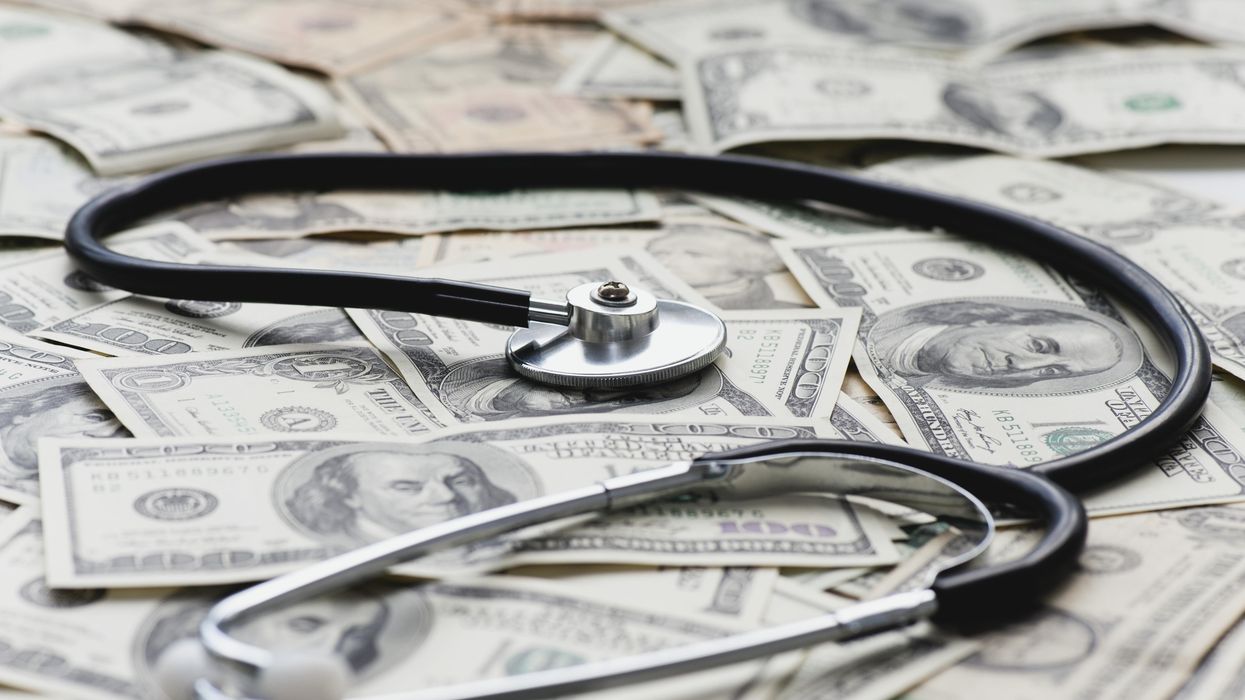Bettino is a volunteer in White Plains, N.Y., for Wolf-PAC, which seeks to build grassroots support for a constitutional amendment permitting more regulation of money in politics.
Imagine emerging from a life-saving medical procedure only to receive bills totaling $80,000 — despite having health insurance. Or, like Californian Tom Saputo, getting a surprise bill for $51,000 after being air-lifted to a hospital for an emergency double-lung transplant. After insurance, he still owed $11,000.
Many of you may not have to imagine these nightmare scenarios, but they're all too real. And whether or not you've experienced horror stories like these, we've all been victimized by the exorbitant costs of health insurance. Legalized bribery is the reason.
The United States now has the only profit-driven health care system in the world, so it's unsurprising we also have the most expensive medical care of any country. In fact, 18 percent of our entire economy ($3.2 trillion) went to health care in 2015, averaging about $10,000 a person.
Why is health care and insurance in this country so much more expensive than elsewhere? It's the intrusion of big money in politics.
We use the euphemism "campaign contributions" to disguise the nefarious truth. Corporations can now make unlimited contributions to elected politicians through the use of the political action committees.
Four of the biggest health insurance companies — Blue Cross Blue Shield, UnitedHealth Group, CVS Health and Cigna— and their employees gave $4.5 million to 2020 presidential and congressional campaigns, with just over half of the cash to Democrats.
Paco Fabian, director of campaigns at Our Revolution, told The Hill, "they're influencing both sides and they're doing it so that regardless of who wins, they continue to influence politics and policy." The same was true four years before, when Donald Trump received $1.3 million from the insurance industry while Hillary Clinton brought in a cool $3.3 million. Donations from the health sector at large were gargantuan: $26.4 million for Clinton and $5.8 million for Trump.
Donations made to politicians are not random charity; they are strategic and expected to procure a hefty return on investment. Recipients are not naïve to this, and they frequently cater to the interests of their most generous donors.
How do "campaign contributions" impact health costs? Quite directly, it turns out, in the form of legislation. In each of the previous two years, the Trump administration allowed insurance companies to raise their premiums 15 percent with no explanation, increasing the likelihood of price spikes for consumers. The previous president, backed by Congress, also weakened regulation of insurers, increased their allowed profit-margins and permitted more flexibility in scaling back benefits — all policies promoted by the health insurance lobby.
Chairman Richard Neal of the House Ways and Means Committee, a gatekeeper of all health legislation, has been the third largest recipient of insurance money in the House. But health insurance companies aren't the only ones with a vested interest in health care industry profits: Private equity group Blackstone and various for-profit hospital groups were major contributors to the Massachusetts Democrat in the last election. Blackstone has lobbied hard to prevent a resolution on surprise medical billing because it owns the physician-staffing company TeamHealth, which profits mightily from this practice.
In 2019 Neal blocked a bipartisan bill aimed at controlling hospitals' ability to send these huge out-of-the-blue bills to patients. In early December Neal once again defended the interests of his private equity donors, putting forth a proposal they endorsed as an alternative to the more aggressive original bill.
As the unfortunate truth of our corrupt system, politicians acting on behalf of their donors is the rule, not the exception.
The average deductible for Americans in 2019 was $4,544, meaning millions of insured patients still paid almost $5,000 out-of-pocket for their health care. Furthermore, many plans don't cover mental health, dentistry or life-saving surgeries deemed "elective" by the insurance companies. For families, the cost of health coverage now exceeds a whopping $20,000. In the past decade, health insurance costs skyrocketed 55 percent, almost double the increase in the median wage over the same time period.
Predictably, health costs are the number one reason Americans declare bankruptcy. It was estimated in 2019 that two-thirds of all bankruptcy filers cited medical expenses or illness-related work loss, not dissimilar to rates before implementation of the Affordable Care Act. The health insurance companies, meanwhile, raked in $35.7 billion in profits the same year.
Regardless of your preferred solution for outrageous health insurance costs, we can all agree that progress is not being made. To address this and all the issues we face, my organization is tackling the root cause: political corruption. Most Americans agree that big donors have outsized influence and want to limit campaign spending. With the grip special interests have on Congress, an amendment to the Constitution ensuring elections free from corruption is the only proven solution.



















Trump & Hegseth gave Mark Kelly a huge 2028 gift